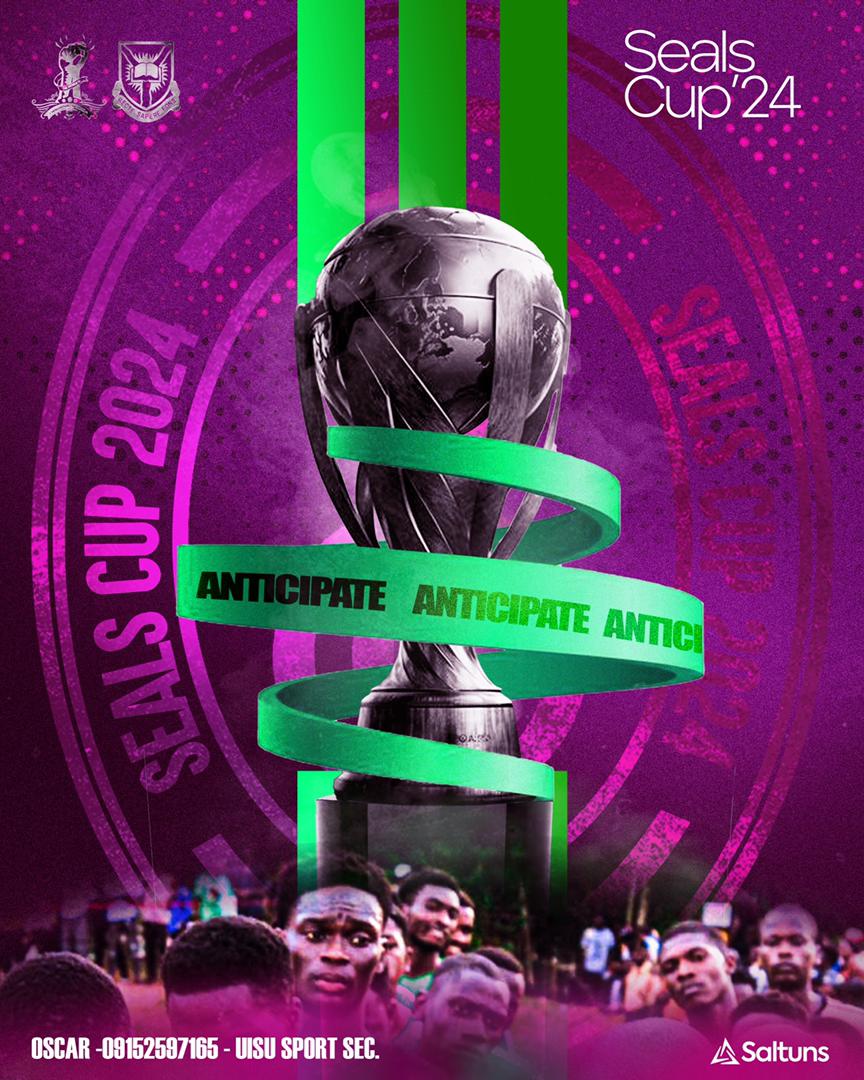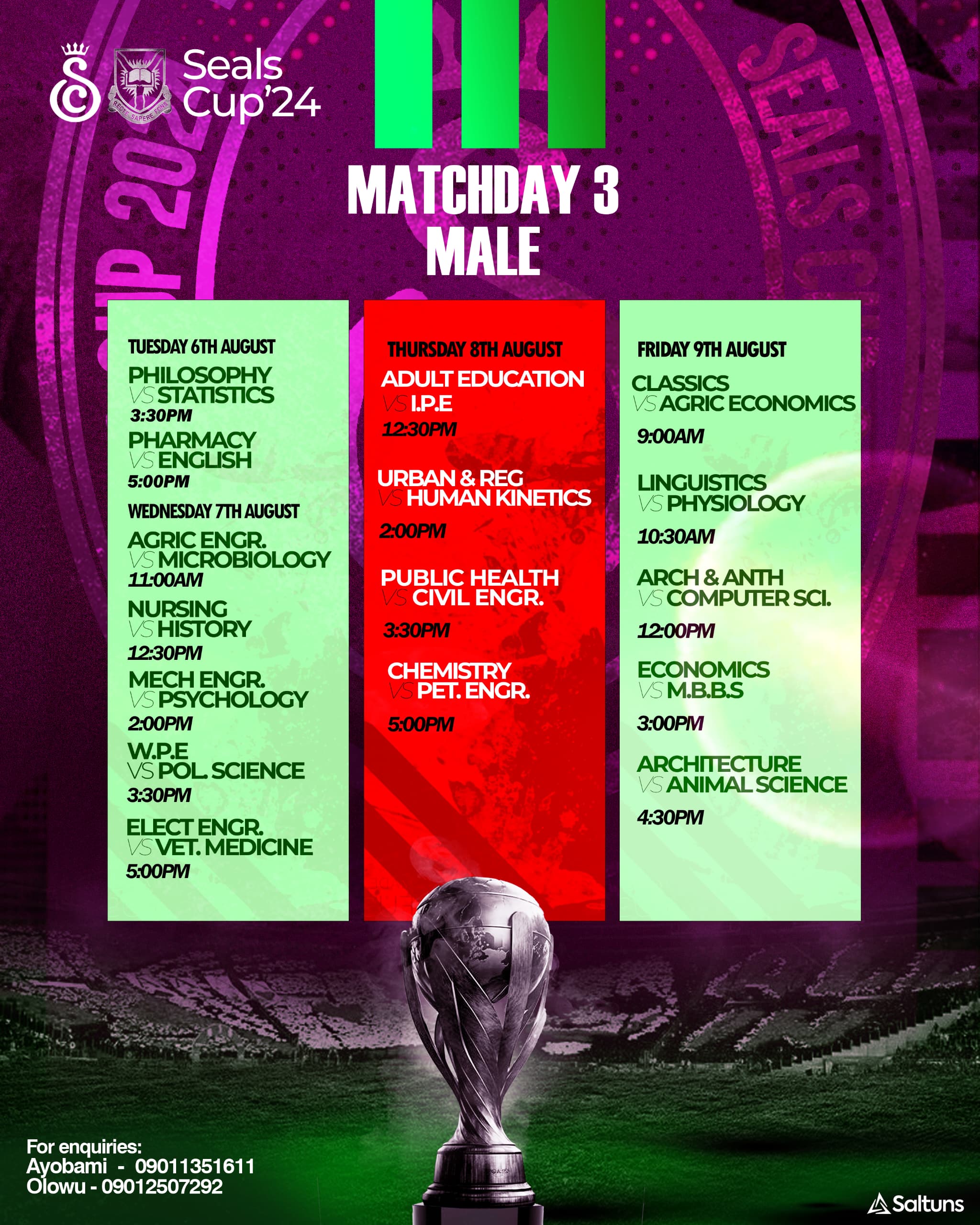SEALS Cup ’24 Organisers, Reps, and Fans: On Circulation of Info and Clarity of Unusualities

When a ‘banters and updates’ group is created for a cause, UI students, upon joining such group chats, expect to see a lot of things, ranging from disparities in thought processes, false information, defaulters of rules and regulations, and a lot more – of course while the group serves its primary purpose, banters and updates.
On the 12th of June, 2024, SEALS Cup 2024 organising committee created the official banters and updates group for effective dispersal of information regarding the competition – which is currently ongoing. Since its creation, it has carried out this purpose, although the efficiency being subjective to different members on the group. While we’ve had intermittent communication through this channel, it has still not been bereft of arguments and back-and-forth between fans and organisers. While its necessity can also be argued from different angles, one thing is clear; the channel of information dissemination is not uniform on everyone’s mind.
For a fan, whenever something is unclear, their first instinct is to tag a group admin or a known member of the organising committee to clarify the issue they noticed. More often than not, they are met with statements like ‘meet your rep for clarification’ or ‘write a letter to us, stating your concerns’. While these sentences in quotes are not lifted verbatim, the takeaway is that the fans are always redirected to the departmental representatives for clarification. The fans see this as an avenue to evade the question, or a stressful alternative to just typing out answers for clarity’s sake.
For members of the organising committee, whenever such questions – that they have provided answers to, either at the Press Conference or in the group containing all departmental representatives – are asked, their first resort is to redirect the fan to their respective departmental reps to explain the circumstances as involved and the clarification made by the organising committee. What makes this flawed? Asking a fan to meet their rep for answers to certain questions means that 1. You have ignorantly concluded that the fan is in a department that is participating in the competition. 2. In the event that your assumption is right, you have denied other students whose departments aren’t participating (as they can’t have reps) answers to such issues that can brew controversies in the nearest future. 3. You have also communicated an impression that fans do not deserve direct answers to whatever clarifications they might have, which defeats part of the purpose the group was created in the first place. Let’s examine 2 scenarios where this played out…
Scenario 1
On the 22nd of July, 2024, a fan on the group demanded that the committee clarify if a particular team were punished for an issue of alleged assault on an officiating staff in a game in SEALS Cup ‘23. From the series of messages sent by this fan, he made his intention known that he wanted clarification so that other teams, who had it in mind that they could repeat the same thing and get away with it, can have a redress. After getting ignored for a while, a member of the organising committee replied and said ‘Whatever complaints you have, inform your reps, simple.’ This reply was met with a lot of dissatisfactory comments and part of the concerns was that, the issue was a matter of public concern and should be treated as such. After so much back and forth on the right thing to do, this committee member said ‘If you have a complaint, write to the SEALS Cup Organising committee. Thank you.’ Fans continued expressing their displeasure stating that other fans/supporters should be aware of the consequences of such actions, in the event where emotions are riled up to repeat the act. After persistent questions asking the committee member of the consequences of such actions if repeated again, he replied saying that the rulebook will be published for everyone to see. After paragraphs of opinions, another member of the organising committee sent a long text explaining the steps that have been taken regarding the issue – which was quite appreciated by a number of fans who were keen on getting answers.
Scenario 2
On the 2nd of August, 2024, another fan quoted a broadcast message displaying the scorelines from the last round of matches played on matchday 1. This fan was surprised to see Public Health – a faculty – participating as a department in a supposedly inter-departmental competition. Although it has been noticed earlier but this was the first time it was brought up on the group in the manner with which it escalated. As usual, the fan tagged a member of the committee to proffer clarification on the matter. While relevance of question was argued and subtle banters were thrown, another member of the committee replied a fan – not the initial fan that raised the issue – that the matter was addressed in the Press Conference and the fan in question should ask his rep for what the final decision was. This could be seen as another ignorant conclusion that the said fan had a rep to ask, should he proceed to look for answers as directed by the committee member. A discourse was raised on how ‘redirecting fans to meet representatives’ is a funny resort. The committee member stood his ground that reps exist to disperse information and decisions made by the organising committee – most especially in controversies. This also dragged for long until the tagged committee member from the original text explained the reason we have Public Health participating as a department.
Way Forward?
First of all, the organisers are responsible for all tournament related issues that needs to be addressed, and as such, responsible to the teams, respective fans, and the general public. The departmental representatives are primarily responsible to their team members. Whenever an issue which can serve as a public concern is raised, it’s in the best interest of everyone for the organisers to respond to the issue, either by forwarding a public statement that has addressed the same issue when raised in the past, or replying the issue civilly in a text format on the official group. For sensitive issues that can’t be directly communicated to the general public, proper channel of dissemination should be stated also. Bad precedents can jeopardise the credibility of a tournament if not properly addressed. Asking fans to meet their reps for certain answers is not befitting considering how urgency might be needed in the clarification of certain concerns. Also, if a public statement or broadcast is being worked on and it addresses an issue raised, the committee can respond to such issues stating that a broadcast will be released very soon to that effect.
A representative is in direct contact with the team players and can efficiently serve as the intermediary between the team and the organising committee. That’s why they are the team’s rep; to protect and communicate the best interests of the team. These reps can’t possibly be a direct contact for every fan because the group isn’t limited to fans from participating departments. As such, the organising committee is obligated to respond or clarify any anomalies or grey areas. Formal complaints, in the form of letters, can only come into play between a team and the organising committee, not between a fan and the organising committee. Representatives should also be dutiful in sending out information that is in the best interests of fans within their reach, this reduces the unnecessary back and forth when unusual cases are brought up. Lastly, fans are expected to understand that the organisers are also students, just like them, who have academic obligations to meet while they sit at the helm of tournaments that bring joy and chance for recreation amidst burdensome schedules. As such, grace should be extended to the organisers to address issues when brought up, issues that are most likely peculiar to an edition. Concerns should also be raised civilly without demeaning the work ethic of these organisers.
As the tournament proceeds, parties involved should be aware of their duties in information dissemination, to allow for proper information flow in order to fulfil an integral part of ‘banters and updates’ which are the core of these groups.
Peter Adeyemo.



